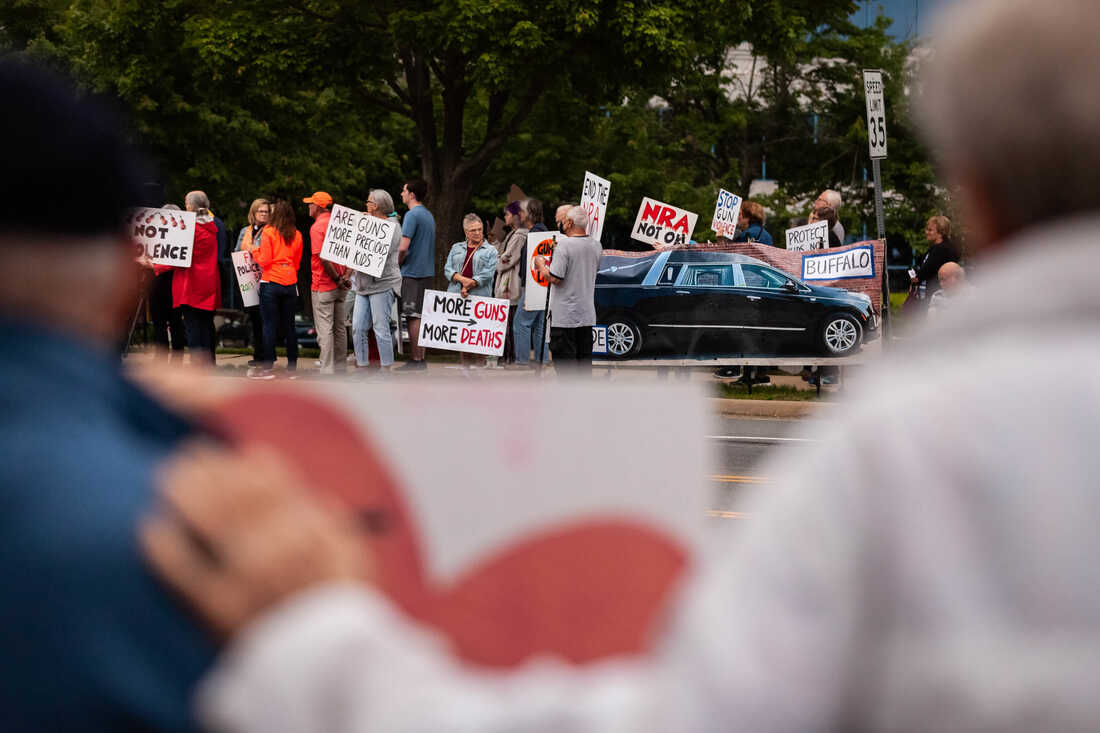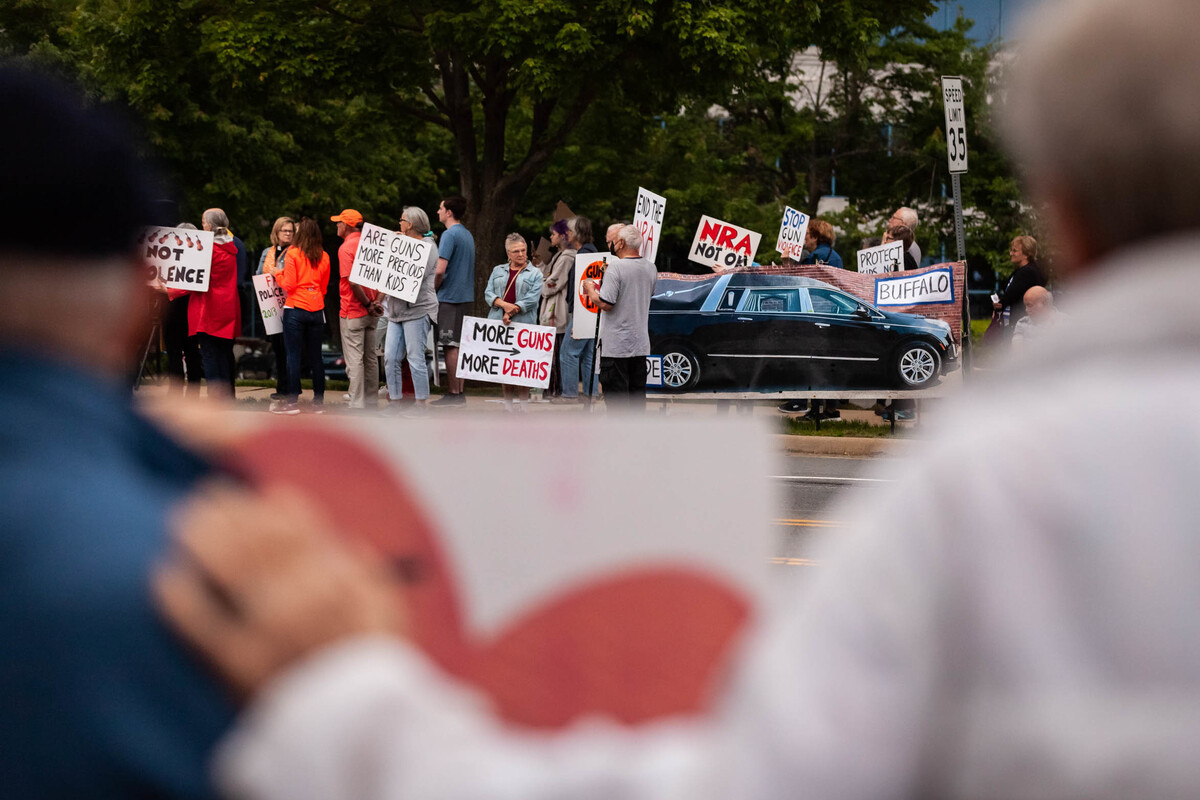What Are The Backgrounds Of Mass Shooters

Demonstrators attend a candlelight vigil Midweek in Fairfax, Va., for the victims of the Uvalde and Buffalo mass shootings. Allison Bailey/Reuters Connect hibernate caption
toggle caption
Allison Bailey/Reuters Connect

Demonstrators nourish a candlelight acuity Wednesday in Fairfax, Va., for the victims of the Uvalde and Buffalo mass shootings.
Allison Bailey/Reuters Connect
Every mass shooting in the U.South. raises calls for better policies to forestall such tragedies. There's show suggesting that certain kinds of laws may reduce deaths from mass shootings, say scientists who written report the field — only those policy options are not the ones usually discussed in the wake of these events.
The body of inquiry scientists have to draw from is limited, notes Michael Anestis, executive director of the New Jersey Gun Violence Research Center at Rutgers University. "Mass shooting research is a very pocket-sized portion of gun violence research," he says.
That'due south because mass shootings business relationship for less than 1% of the roughly 40,000 people killed by guns each year in this state, Anestis explains. "They're horrific, they are all too common, and notwithstanding, it's simply the very tip of the iceberg, right?"
Those researchers who exercise report gun violence tend to focus on the kinds of violence, similar suicide, associated with the nearly deaths, he says. Just, he adds, the entire field of gun violence enquiry has long been neglected and hardly funded.
"There is money out there, but it is really far below where it should exist given the amount of injury and death and economical costs associated with gun violence," says Anestis. "Information technology's merely disproportionally underfunded."
Two approaches worked better than others
Still, some studies take findings about what might foreclose mass shootings.
One such study took advantage of the fact that in the U.Due south., gun laws vary from state to state. "That is, honestly, less than ideal from a public safety standpoint, merely it does provide researchers with opportunities," says Daniel Webster, co-managing director of the Johns Hopkins Center for Gun Violence Solutions.
He and some colleagues recently analyzed more than 30 years of data on shootings in the U.Due south. that involved four or more than victims. They compared states to try to tease out the effect of various gun laws. "I have to acknowledge that this is a really hard and, frankly, inexact science," says Webster.
Despite those limitations, he says, "We did observe two policies that had significant protective furnishings in lowering rates of fatal mass shootings."
One was a requirement that a gun purchaser go through a licensing process. "A licensing process requires someone to, you know, directly utilize and engage with police enforcement, sometimes there's safe training and other requirements," says Webster.
Another approach that seemed to reduce deaths from mass shootings was country bans on buying large-capacity magazines or ammunition-feeding devices for semiautomatic weapons.
That makes intuitive sense, says Webster, because these items allow a shooter to fire many bullets in a curt amount of time without interruption. If a shooter has to stop and reload, victims could escape or fight back.
There's another study of mass shootings showing that this kind of law seemed to have a protective effect. David Hemenway, director of the Harvard Injury Control Research Eye, worked with colleagues to examine the result of banning large-capacity magazines on almost iii decades of mass shootings in unlike states.
"Us which had bans did much improve in terms of having fewer mass shootings, and the mass shootings that occurred were much less lethal in terms of the number of people dying," says Hemenway.
What almost background checks or having police at schools?
In the wake of a mass shooting, people oftentimes argue for the need for comprehensive background checks, says Webster. He supports that policy but says his inquiry doesn't testify that information technology'due south linked to a reduction in this particular kind of mortiferous event.
An additional mutual refrain subsequently a mass shooting, he says, is a call for policies that make it easier for people to deport guns then they can defend themselves. "Well, guess what, the data exercise non behave that out at all," says Webster. "If anything, it shows college rates of fatal mass shootings in response to weaker regulations for curtained carry by civilians."
And while schoolhouse systems might try to respond to the threat of mass shootings by having constabulary officers on site or having students go through drills, "as far as I know, in that location'south not potent research about any of those things," says Hemenway.
Keeping guns abroad from immature people, whether through safe storage of firearms in a home or historic period restrictions on purchasing, would be expected to accept a protective result, says Webster, based on information showing that "the summit ages for violent offending with firearms is roughly 18 to 21."
The public health risks associated with young people drinking alcohol inspired a ban on drinking nether the age of 21, he says. But the shooter in Uvalde was able to legally purchase semiautomatic rifles just after his 18th birthday.
It seems plausible that age restrictions might make information technology harder for young adults to access weapons capable of creating a mass shooting, says Anestis, simply "exercise nosotros have large data-based resources to evaluate those policies? No, nosotros don't."
Ane emerging policy choice that has some preliminary evidence behind information technology is allowing police officers to temporarily take guns away from people who seem to pose an imminent danger. A study in California that looked at how this process got used over a two-year period in that state found 21 occasions when information technology was washed in response to threats of a mass shooting — several of which involved schools.
It's not possible to know if taking away those guns really prevented mass shootings, but researchers say it'southward even so of import data given the general dearth of data and limited funding for enquiry. One study in 2017 found that guns killed nearly as many people each year as sepsis, a life-threatening response to infection, simply funding for gun violence research was most 0.vii% of that for sepsis.
"There's so many things to report in the gun surface area, and we've had not well-nigh enough studies for 25 years," says Hemenway. "Once y'all scratch the surface right now about what is known, we know so little."
What Are The Backgrounds Of Mass Shooters,
Source: https://www.npr.org/sections/health-shots/2022/05/26/1101423558/how-can-mas-shootings-be-prevented-definitive-answers-are-hard-to-come-by
Posted by: cannonbenty1991.blogspot.com


0 Response to "What Are The Backgrounds Of Mass Shooters"
Post a Comment